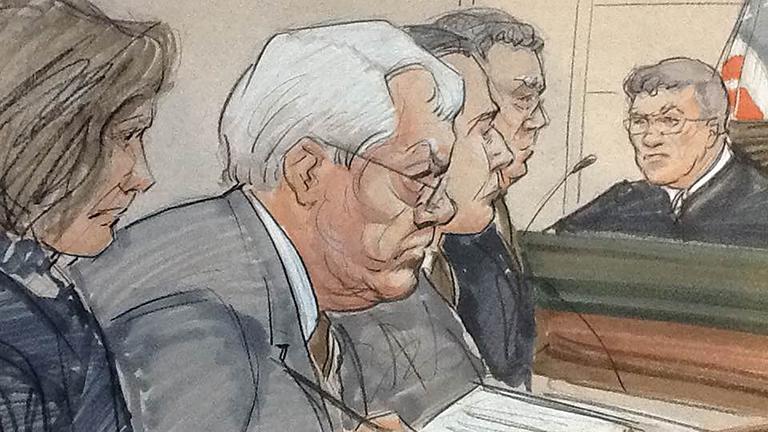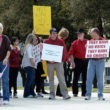There’s nothing to celebrate about the sad conclusion of Denny Hastert’s public life.
The tragedy, the pathos, the abuse of teenage boys over whom he exercised so much control.
A broken, disgraced man in a wheelchair, ending his career in government housing: sentenced to 15 months for illegally structuring bank withdrawals to funnel money to a man he had sexually abused while coaching a high-school wrestling team.
So much for “the Coach.”
I last saw Denny Hastert in a Texas courtroom in 2011, when he was a character witness at the sentencing hearing of former House Majority Leader Tom DeLay. Hastert was almost unrecognizable, hunched over, speaking in subdued almost hushed terms, telling a state district judge that the real Tom DeLay was known for his conservative beliefs, religious values, and his work to help foster children.
Hastert is the last of the Tom DeLay team to begin a slow fade to obscurity after public disgrace
In fact, the real Tom DeLay only weeks earlier had been convicted of money laundering, after a jury heard from 40 witnesses and examined photocopies of checks that had been used to launder campaign money—under DeLay’s direction.
DeLay was sentenced to three years in prison, but a state appeals court, in a state totally dominated by Republicans, subverted the law to overturn the conviction.
DeLay was (and is) as guilty as Denny Hastert, the man he personally made Speaker of the House when Republican House leadership was vertically collapsing in the wake of the House vote to impeach Bill Clinton.
Now Hastert is the last of the DeLay team to begin a slow fade to obscurity after public disgrace. But heading toward November, with Donald Trump planning to revisit Bill Clinton’s impeachment, or at least the Monica Lewinsky passages of Special Prosecutor Ken Starr’s report, let’s go there. To December 1, 1999, the day the House voted to impeach Bill Clinton, the same day Tom DeLay’s first choice for speaker, Louisiana Rep. Bob Livingston, announced his resignation.
Livingston, married at the time, resigned because Hustler magazine publisher Larry Flint was preparing a story that included accounts of four women who claimed to have been intimately involved with Livingston over the previous 10 years.
House Republicans had followed Majority Whip DeLay’s directions and unanimously voted for Livingston to succeed outgoing Speaker Newt Gingrich, and it was up to DeLay to find a replacement for Livingston.
The Republican House leadership was unraveling.
Gingrich had admitted he had been in an affair with congressional aide Callista Black (later to become his third wife). The affair was not the reason for Gingrich’s resignation. But it didn’t stop him from pushing for the impeachment of Clinton, or from excoriating Clinton for his moral transgressions in the White House.
Nor did Livingston’s philandering (among the worst kept secrets on Capitol Hill) diminish his support for the impeachment of Clinton.
So Denny Hastert, the former wrestling coach from small-town Illinois, was hand picked to be Speaker of the House by Tom DeLay.
This past week, just as Hastert stood up for DeLay’s character in court, DeLay vouched for Hastert as he faced his own moment of reckoning in a federal courtroom, describing his former colleague in a memo to the judge. “He is a man of great integrity. . . He is a good man that loves the Lord. He gets his integrity and values from Him.”
Two criminals making special pleadings on each other’s behalf.
“Pigs is pigs,” a Texas Supreme Court justice once said of trial lawyers charging high contingency fees. The same can be said of the congressmen who led their party’s morally self-righteous prosecution of Bill Clinton. Two philanderers, a money launderer, and a serial pedophile.
Their story, however, involves more than swinish and felonious behavior. Far worse than their public disgrace is the damage Gingrich, DeLay, and Hastert did to the Congress of the United States while they held power. The seeds of dysfunction in today’s polarized House, which cannot fulfill the most basic functions envisioned by the Founders, were sown by DeLay and Hastert.
Most famously, there is the Hastert Rule, decreeing that no bill can be brought to the floor without the support of a majority of the Republican bloc. The rule was intended to marginalize the minority party, eliminating any prospect of compromise because compromise would never be needed. Bills would be passed without the votes of Democrats.
Another procedural change that is easily ignored but impairs the Congress to this day is the abuse of the “closed rule” and “modified closed rule,” by which the Speaker denies members of the House the right to amend bills. Closed rules also are used to render the minority party inconsequential. Under closed rules, floor votes in the House are “plebiscites,” former Rep. Barney Frank (D-Mass.) told me at the time: “You were left with the choice to vote yes or no. That was our role.”
Scott Lilly, at the time a senior House staff member who witnessed firsthand the destruction Hastert (“the Coach”) and DeLay (“the Hammer”) did to the institution, describes it in detail in a recent Huffington Post piece called “The House That Denny Built.”
Not only was Hastert often muscled around by DeLay. As Speaker, Hastert was disengaged from issues and at times from his responsibilities as Speaker. “The Coach” often left the thinking and heavy lifting to his Chief of Staff Scott Palmer, with whom he shared an apartment in Washington. Palmer was widely credited with keeping Majority Leader DeLay from sucking up all the oxygen and completely usurping the authority of the Speaker.
But DeLay exercised unprecedented power for a Majority Leader, and if DeLay never had a proclivity for boys, Denny Hastert was Tom DeLay’s boy in another way.
Hastert had run DeLay’s campaign for whip and was immediately appointed deputy whip when DeLay won. DeLay then supported Hastert, advanced his career, and when Bob Livingston went down made Hastert Speaker-elect—because DeLay knew he himself was too polarizing to serve. He would exercise the raw power that earned him the name “the Hammer” from behind the Speaker’s chair.
But even as whip under Newt Gingrich, DeLay was a force in the House. In reporting for a book we did about DeLay, Jan Reid and I learned from Republican staffers and former House members that DeLay was something of a Godfather. He understood that knowledge was power.
“He knew who had money problems, and who had marital problems, who had drinking problems and who had deviated from the official mores of the Republican House: abstinence, heterosexual relationships among consenting unmarried adults, marital fidelity and discreet infidelity. On one occasion he told a closeted gay Republican he would advance no further and it was time for him to leave.”
Despite all that, it appears that Tom DeLay failed to run a background check on the one-time wrestling coach he decided to elevate to the third-highest position in our nation’s government.
“Hastert turned white as a sheet,” when DeLay told him he had to run for Speaker, a source told me in 2003.
Perhaps now we know why.







He’s the crowning example of conservative “family values” hypocrisy.